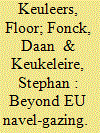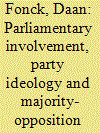| Srl | Item |
| 1 |
ID:
147691


|
|
|
|
|
| Summary/Abstract |
Whilst concerns about the EU-centric character of EU foreign policy analysis have become more frequent in recent years, a systematic toolbox for diagnosing and remedying this problem is still lacking. This article’s contribution is twofold. First, it proposes a new typology of three approaches to foreign policy analysis, offering conceptual body and nuance to the debate on EU-centrism. The typology can be used for scrutinising existing analyses, as well as for shaping new research projects. Second, this typology is applied in a meta-analysis of post-Lisbon EU foreign policy scholarship: a built-for-purpose dataset of 451 articles was analysed, covering all work on EU foreign policy published in seven key journals for the period 2010–2014, was analysed. It was found that academic work on EU foreign policy wass indeed rife with EU-centric research questions, and, moreover, that this is the case irrespective of either the policy area under study or the focus of the journal.
|
|
|
|
|
|
|
|
|
|
|
|
|
|
|
|
| 2 |
ID:
166606


|
|
|
|
|
| Summary/Abstract |
This article examines the impact of parliamentary involvement in troop deployment decisions on restrictions on military mandates by examining the Belgian contribution to the 2011 Libya intervention and the coalition against the self-proclaimed Islamic State. More specifically, we analyse (1) the effect of party ideology on mandate preferences, and (2) the impact of bargaining between majority and opposition parties on the outcome of mandate negotiations. Our case study demonstrates that left-wing parties show a strong inclination toward imposing restrictions on the use of military force beyond humanitarian goals, while right-wing preferences tend to depend on the national interests at stake in the operation. With regard to majority-opposition bargaining, our study shows that the impact of opposition parties is dependent on the degree of contention between government and opposition parties, as well as on the extent to which the executive needs to seek support across its own majority.
|
|
|
|
|
|
|
|
|
|
|
|
|
|
|
|